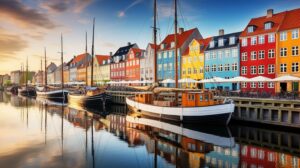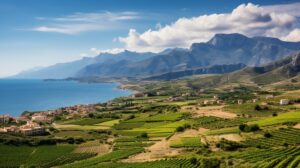AE is the abbreviation for the United Arab Emirates (UAE), a country located in West Asia. Situated at the eastern end of the Arabian Peninsula, it shares borders with Oman and Saudi Arabia and has maritime borders in the Persian Gulf with Qatar and Iran. The capital of the United Arab Emirates is Abu Dhabi, while the largest city is Dubai. Known for its diverse economy, the country thrives on tourism and business. Islam is the official religion, and Arabic is the official language. The United Arab Emirates is an elective monarchy formed from a federation of seven emirates, with a population of approximately 9.2 million, consisting predominantly of expatriates. Notably, the United Arab Emirates is renowned for its vast reserves of oil and natural gas.
Key Takeaways:
- The United Arab Emirates (UAE) is located in West Asia, at the eastern end of the Arabian Peninsula.
- It shares borders with Oman and Saudi Arabia and has maritime borders in the Persian Gulf with Qatar and Iran.
- The capital of the UAE is Abu Dhabi, and the largest city is Dubai.
- The country’s economy is diverse, with a strong emphasis on tourism and business.
- Islam is the official religion, and Arabic is the official language of the UAE.
- The UAE is an elective monarchy formed from a federation of seven emirates.
- The population of the UAE is approximately 9.2 million, with a majority of expatriates.
- The United Arab Emirates is known for its abundant reserves of oil and natural gas.
Location and Geography of AE
The United Arab Emirates is situated in West Asia, at the eastern end of the Arabian Peninsula, and shares borders with Oman and Saudi Arabia. It is located in a strategic position, bordering the Persian Gulf, which gives it an advantage in maritime trade and transportation. The country is known for its stunning coastline, picturesque beaches, and vast desert landscapes.
The United Arab Emirates is made up of seven emirates, namely Abu Dhabi, Dubai, Sharjah, Ajman, Umm Al Quwain, Ras Al Khaimah, and Fujairah. Each emirate has its own distinct characteristics and attractions, contributing to the overall diversity of the country.
The geography of the United Arab Emirates is characterized by a combination of desert, coastal plains, and mountains. The vast desert, known as the Rub’ al Khali or the Empty Quarter, covers a significant portion of the country’s land area. The coastal plains are home to vibrant cities like Abu Dhabi and Dubai, while the Hajar Mountains provide a stunning backdrop to the eastern region.
Table 1: Major Cities in the United Arab Emirates
| Emirate | Capital | Largest City |
|---|---|---|
| Abu Dhabi | Abu Dhabi | Abu Dhabi |
| Dubai | Dubai | Dubai |
| Sharjah | Sharjah | Sharjah |
| Ajman | Ajman | Ajman |
| Umm Al Quwain | Umm Al Quwain | Umm Al Quwain |
| Ras Al Khaimah | Ras Al Khaimah | Ras Al Khaimah |
| Fujairah | Fujairah | Fujairah |
Capital and Major Cities of AE
The capital of the United Arab Emirates is Abu Dhabi, while the largest city is Dubai, both of which play crucial roles in the country’s development and growth.
Abu Dhabi, located on the northeastern part of the Persian Gulf, is not only the capital but also the political and economic center of the United Arab Emirates. Its strategic location has made it a hub for government institutions, international organizations, and businesses. The city is known for its impressive skyline, modern infrastructure, and world-class amenities.
Dubai, on the other hand, is a bustling metropolis located on the southeast coast of the Persian Gulf. Known for its iconic skyscrapers, luxurious resorts, and vibrant nightlife, Dubai has become a global city and a major tourist destination. It is also a significant center for finance, trade, and transportation.
| City | Region | Population |
|---|---|---|
| Abu Dhabi | Abu Dhabi Emirate | 1.6 million |
| Dubai | Dubai Emirate | 3.3 million |
| Sharjah | Sharjah Emirate | 1.4 million |
| Ajman | Ajman Emirate | 382,000 |
These cities, along with other major urban centers like Sharjah and Ajman, contribute significantly to the country’s economic growth, attracting businesses, investors, and tourists from around the world.
The United Arab Emirates continues to invest in the development and infrastructure of its capital and major cities, ensuring their continued success and prominence on the global stage.
Economy of AE
The United Arab Emirates boasts a diverse economy, with a strong focus on tourism and business sectors that drive its economic growth and development. The country’s strategic location, remarkable infrastructure, and progressive business environment have made it a popular destination for both leisure and business travelers. The United Arab Emirates has experienced tremendous growth in the tourism sector, attracting millions of visitors each year.
One of the key contributors to the country’s economy is the vibrant tourism industry. From luxury hotels and resorts to breathtaking landscapes, the United Arab Emirates offers a wide array of attractions and experiences for tourists. The iconic city of Dubai, known for its towering skyscrapers and luxurious developments, has become a global hub for tourism and trade. It is home to world-class shopping malls, entertainment venues, and renowned landmarks like the Burj Khalifa, the tallest building in the world.
In addition to tourism, the United Arab Emirates is also recognized for its thriving business sector. The country has become a preferred destination for international companies looking to establish a presence in the Middle East. With its investor-friendly policies, tax incentives, and state-of-the-art infrastructure, the United Arab Emirates has attracted numerous multinational corporations and entrepreneurs. Dubai, in particular, has developed into a major business hub, hosting conferences, exhibitions, and trade events that attract industry leaders from around the world.
| Tourism | Business |
|---|---|
| High influx of tourists annually | Preferred destination for international businesses |
| Diverse range of attractions and experiences | Investor-friendly policies and tax incentives |
| World-class hotels and resorts | State-of-the-art infrastructure |
The United Arab Emirates’ economic success is also attributed to its significant reserves of oil and natural gas. These resources have played a vital role in driving the country’s development and transforming it into a global economic powerhouse. However, the United Arab Emirates has recognized the need to diversify its economy and reduce its reliance on fossil fuels. As a result, the government has implemented various initiatives and reforms to stimulate growth in non-oil sectors, such as tourism, finance, real estate, and technology.
In conclusion, the United Arab Emirates has built a strong and diverse economy through its strategic focus on tourism and business sectors. The country’s impressive infrastructure, favorable business environment, and natural resources have positioned it as a global destination for both leisure and business travelers. With ongoing efforts to diversify its economy, the United Arab Emirates is poised to continue its remarkable growth and contribute to the global business landscape.
Culture and Religion in the United Arab Emirates (AE)
The United Arab Emirates has Islam as its official religion and Arabic as its official language, influencing the rich cultural heritage and traditions observed within the country. The culture of the UAE is a blend of tradition and modernity, shaped by its historical roots and the influences of its diverse population. From its traditional dance forms to its traditional attire and cuisine, the UAE showcases a unique and vibrant cultural scene.
With Islam at its core, the UAE places great importance on religious practices and observance. The call to prayer can be heard from mosques throughout the country, serving as a reminder of the role of religion in daily life. Islamic festivals such as Eid Al-Fitr and Eid Al-Adha are widely celebrated, bringing communities together and highlighting the spirit of unity and generosity.
The official language of Arabic is widely spoken in the UAE, but due to its diverse population, English is also widely used, especially in business and commerce. This linguistic diversity adds to the cultural tapestry of the country, fostering an environment of multiculturalism and tolerance.
The UAE’s Cultural Practices and Traditions
The cultural practices and traditions in the UAE reflect the values and beliefs of its people. Hospitality plays a crucial role in Emirati culture, and guests are welcomed with open arms, often being offered dates and Arabic coffee as a sign of respect. Traditional arts and crafts, such as weaving, pottery, and henna painting, are cherished and passed down through generations.
The UAE’s traditional music and dance forms, such as the Ayyala and Al-Razfa, are an integral part of the cultural fabric, showcasing the country’s deep-rooted traditions. Emirati cuisine is a reflection of the region’s history and diversity, incorporating flavors and ingredients from Arabic, Persian, Indian, and African influences.
In conclusion, the United Arab Emirates embraces its Islamic culture and Arabic language while remaining open to the influences of its diverse population. The country’s rich cultural heritage, seen through its traditions, arts, and cuisine, is a testament to its vibrant and inclusive society.
| Key Cultural Aspects | Religion | Language |
|---|---|---|
| Traditions and customs | Islam | Arabic |
| Hospitality | English | |
| Traditional arts and crafts | ||
| Music and dance | ||
| Cuisine |
Governance and Population of AE
The United Arab Emirates operates under an elective monarchy system, formed by a federation of seven emirates, and has a population of approximately 9.2 million, with a majority being expatriates. The country’s governance structure is characterized by a ruling hereditary monarchy, where the President is elected by the Supreme Council of Rulers, consisting of the seven emirate leaders.
This unique system of governance ensures stability and continuity in the decision-making process, allowing for the smooth functioning of the country’s institutions. The President serves as the head of state, while the Prime Minister holds executive powers as the head of government.
The United Arab Emirates has experienced rapid population growth in recent years, largely driven by an influx of expatriates. These expatriates come from various countries around the world, attracted by the country’s thriving economy and employment opportunities. They contribute to the cultural diversity and cosmopolitan atmosphere that the United Arab Emirates is known for.
With a population of approximately 9.2 million, the United Arab Emirates has become a vibrant and dynamic society that embraces a blend of traditions and cultures. The government recognizes the importance of integrating expatriates into society and has implemented policies to facilitate their integration, providing them with access to public services and opportunities for personal and professional growth.
FAQ
Q: What country is AE?
A: AE refers to the United Arab Emirates, a country located in West Asia, at the eastern end of the Arabian Peninsula.
Q: What is the location and geography of AE?
A: The United Arab Emirates shares borders with Oman and Saudi Arabia and has maritime borders in the Persian Gulf with Qatar and Iran. It is situated in a specific region in West Asia.
Q: What is the capital and major cities of AE?
A: The capital of the United Arab Emirates is Abu Dhabi, and the largest city is Dubai. Abu Dhabi holds significant importance, while Dubai plays a major role in the country’s development.
Q: What is the economy of AE?
A: The United Arab Emirates has a diverse economy with a focus on tourism and business. The country attracts many tourists and is a hub for various business activities.
Q: What is the culture and religion in AE?
A: Islam is the official religion in the United Arab Emirates, and Arabic is the official language. The country has a rich cultural heritage and observes various traditional practices and customs.
Q: How is AE governed, and what is its population composition?
A: The United Arab Emirates is an elective monarchy formed from a federation of seven emirates. The country has a population of approximately 9.2 million, with a significant number of expatriates residing in the country.



